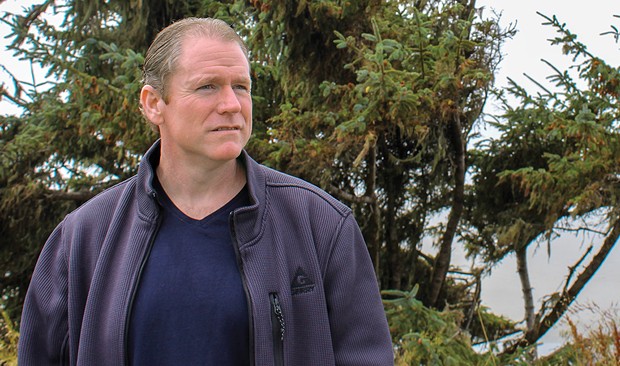Freeing Aaron Bjorkstrand
Arrested at 15 and incarcerated for 26 years, a McKinleyville man works to start anew
By Thadeus Greenson [email protected] @ThadeusGreenson[
{
"name": "Top Stories Video Pair",
"insertPoint": "7",
"component": "17087298",
"parentWrapperClass": "fdn-ads-inline-content-block",
"requiredCountToDisplay": "1"
}
]
It's July 23 and Aaron Bjorkstrand is dressed in a jail jumpsuit, on his way through a long hallway that connects the jail to the Humboldt County Courthouse. When transferred to the jail six months earlier, Bjorkstrand says he immediately noticed it had changed over the years.
"When I was there, it was still new," he says. "Now, it's like a Jackson Pollock painting — run down, with this slime or food on the wall."
Bjorkstrand has also changed in the 26 years since he was arrested as a 15 year old, tried as an adult and given a life sentence in this same courthouse.
A bailiff leads Bjorkstrand, now 42, to a seat in the jury box of Courtroom One. He trembles as Humboldt County Superior Court Judge Lawrence Killoran makes his way through the morning calendar, wondering if he might soon live the moment that he'd spent years telling himself not to dare to hope for.
Finally, after a recess to bring in a court recorder and clerk, Killoran calls Bjorkstrand's case, ready to hear a motion brought by the Humboldt County Public Defender's Office asking the judge to recall and resentence Bjorkstrand under a new law that went into effect in January giving courts the authority to revisit old cases.
Killoran begins by recounting the specifics of Bjorkstrand's underlying crime, detailing how before dawn on Sept. 16, 1998, high on methamphetamine, he robbed a McKinleyville gas station at gunpoint and shot the clerk twice, seriously injuring him, before fleeing.
"I couldn't stop shaking," Bjorkstrand says of sitting in court and as Killoran spoke, adding that things then "flipped" and the judge began recounting changes in the law, noting people are no longer sent to adult court for crimes committed when they were 15 and that firearms enhancements — the kind that tacked 25 years to life onto Bjorkstrand's sentence — are no longer mandatory. And Killoran noted that Bjorkstrand has gotten his GED and taken a host of courses in prison, while staying relatively out of trouble. "It was an intense moment."
Then Killoran says he feels it's in the interest of justice to resentence Bjorkstrand, striking the firearm enhancement, reducing his sentence to a determinant term of five years and ordering he be released from custody.
"My knees felt like rubber and I thought I was going to fall down," Bjorkstrand says, adding that all he can recall of that moment is asking his attorney, Deputy Public Defender Adrian Kamada, "When are they going to let me go?" and being told, "As soon as they process the paperwork."
"I got back to my cell and I just broke down. I cried," Bjorkstrand says. "It was taking me to a lot of strange places in my mind."
Wanting to get himself together, Bjorkstrand says he went to take a shower but was interrupted part way through when a correctional officer told him that he had to go get dressed. After drying himself off, Bjorkstrand, who had spent his entire adult life in jail and prison-issued jumpsuits, says he was taken aback by what had been left out for him.
"I'm looking at people clothes," he says, the power of the moment still evident in his voice.
Next thing he knew, Bjorkstrand says he was following Kamada out of the Fifth Street side of the courthouse, through the jail's visitor waiting area, out the double doors and into the sunshine. The next 18 hours were "surreal," Bjorkstrand says. Kamada took him to the pharmacy and then to lunch, where he got "a bacon cheeseburger and hot fries and a Coke," which "just felt like it was a dream." Kamada took Bjorkstrand to check in with the local parole office, which agreed that because he had served 26 years on what was now a five-year sentence, his accumulated custody credits would be more than enough to alleviate the need for parole supervision. They asked him to come back the following Thursday, at which point all the paperwork would be ready to officially discharge him.
Then, Kamada took him to his mother's McKinleyville home, giving him a few minutes to collect himself in the car before going inside, and urging him to just take things a day at a time.
But hours later, Bjorkstrand would be back in jail and heading back to prison, having done — by all accounts — nothing wrong.
'Great Disruption and Dysfunction'
Documents in Bjorkstrand's case file paint a picture of a teenager spiraling out of control in the weeks before he showed up at the gas station on Murray Road with a .38 revolver, though nothing about his young life seems to have been easy.
Bjorkstrand was born Dec. 17, 1982, the fifth and last child of Catherine Bjorkstrand, who would later tell a probation officer she'd been unaware she was carrying Aaron until she was seventh months pregnant. Bjorkstrand never knew his biological father but considered his stepfather, Paul Bjorkstrand, a parent, according to court documents.
A 2000 probation report notes Bjorkstrand's entire family "has a history of alcohol and/or drug abuse and arrest records for theft," and indicates Bjorkstrand's first exposures came early. According to one report, he told a probation officer he first used cannabis when he was 9 or 10 when one of his siblings' friends thought he was "a cute little kid" and gave him some. By 14, he said he'd tried methamphetamine, cocaine, heroin and LSD, saying his favorite was crystal meth "because of the quick energy high associated with it," according to the report.
Bjorkstrand attended Morris Elementary School in McKinleyville and his school records show "a relatively positive start, with comments about his eagerness to learn, polite demeanor, attitude and interest level," according to a probation report. But signs of learning difficulties would soon surface, the report states, which were in part attributed to chronic ear problems. In late grade school and early middle school, attendance became "an increasing problem," as did "angry outbursts, profanity, fighting and disrespect" and he was placed on an independent study program at the request of his mother.
In early 1998, Catherine Bjorkstrand began a 10-month prison sentence for robbery with a prior and Aaron was placed in foster care before going to live with his grandparents. Aaron Bjorkstrand had been in trouble before — at 10 he was caught bringing a knife to school, and at 14 he was declared a ward of the state after admitting to possessing stolen property and vandalism after he was caught egging a residence — but things escalated quickly after his mother was sent to prison.
In August, he was caught stealing two credit cards and their PIN numbers from his grandparents, with the cards used to illegally withdraw $1,200 from their accounts. But the context of the case is perhaps more troubling than the basic facts.
A probation report penned after Bjorkstrand was arrested for the shooting recounts the incident in detail. The basics are as follows: Bjorkstrand took the cards from his grandparents thinking it would be an easy way to "impress some older dealers and get everyone some drugs and that he would find a way to return the cards and make it up to his grandparents later." The report names four people — all ages 34 to 40 — who then took the cards and used them to buy some groceries, as well as some items that could be traded for drugs, which they shared with a kid less than half their age.
Bjorkstrand's grandparents told an officer he was "generally loveable and respectful but with 'sticky fingers,' according to a probation report, and he was just given a citation in the case, though he was arrested again before the court date given. He would later tell a probation officer that by the time he arrived at the Union 76 Gas Station on Murray Road in the early morning hours of that day a few weeks later in 1998, he'd been awake for about two weeks straight and was high on methamphetamine and LSD.
'It Doesn't Even Feel Real'
Eric McCaw answered the phone at work earlier this month to find a reporter on the line, looking for a man by the same name who was shot during a gas station robbery some 25 years ago.
"They released that fucker the other day," McCaw says excitedly before later agreeing to talk to the Journal on two conditions: that the paper wouldn't disclose where he's currently living or working, as he still lives with some fear and doesn't want Bjorkstrand to know where to find him in the event he'd ever be inclined to look.
After expressing some frustration that he wasn't contacted as a part of the resentencing process — the DA's Office told the court it had been unable to locate him — McCaw says he still remembers the night in question clearly.
"There's that lovely Aaron Bjorkstrand scar on my stomach," he says, noting it's a constant reminder. "I'm staring at it right now."
McCaw says he was 27 at the time and had been working at the gas station for a couple of weeks, describing it as a fill-in job while he waited for a position to open up at Costco.
Bjorkstrand would later tell a probation officer that he had been using meth at a drug house in the hours before the robbery when a dealer, who was about twice his age, demanded he repay a $100 drug debt — money he did not have.
"The meth dealer then threatens Aaron's life unless he gets the money by robbing the gas station," Kamada's motion for resentencing states in a recounting of the case. "The meth dealer gives Aaron the handgun and drives him to the gas station."
McCaw would later tell police he saw Bjorkstrand show up at the station that morning and he was acting "nervously." He went to use the pay phone — Bjorkstrand later told a probation officer he'd tried to call a friend to come pick him up, not wanting to go through with the robbery — and loitered outside before entering.
Once inside, Bjorkstrand wandered through the mini mart. He picked up a couple of pieces of candy from the two-for-$1 section, only to later put them back and pick up a pack of Bubblicious and a Pepsi. At one point he knocked over a mop McCaw had been using, told the clerk, "I'm sorry," and picked it up, with McCaw later testifying Bjorkstrand was "just kind of loitering around the store but real nervously."
Eventually, he brought the soda and gum to the counter and McCaw rang him up, telling him the total is $1.44 and putting the items in a bag. As he did this, Bjorkstrand pulled the gun from his pocket and said, "Give me all the cash." But as McCaw was handing over the less than $200 in cash from the register, Bjorkstrand shot him in the lower abdomen. A moment later, he fired again, hitting McCaw in the upper left side. (Bjorkstrand would later say in a statement that he'd fired accidentally the first time, explaining the gun was cocked and he'd been shaking violently and must have accidentally hit the trigger, and then shot McCaw again because he thought, "I might as well get this over.")
Bjorkstrand later told a probation officer that he then fled the gas station and hid in the bushes outside, "until he could stop vomiting," then went to a friend's house. Before he was arrested two days later, he said he took about $100 from the robbery and put it in his grandparents' cabinet to start to repay the credit card debt.
McCaw, meanwhile, was rushed to Mad River Community Hospital, where he credits "one of the best doctors in the world," Luther Cobb, with saving his life, recounting how he underwent hours of emergency surgery to remove several feet of intestine and half his stomach. "It was pretty freaking painful," McCaw says, saying he wound up back in the hospital's intensive care unit a couple weeks later after an infection he described as looking like an erupting Mount Vesuvius took hold in his stomach.
"It doesn't even feel real," McCaw reflects, pausing before adding that he still suffers stomach pains and violent coughing and choking fits as a result of the shooting.
'A Dark Place'
About a year after the shooting, a Humboldt County Superior Court judge ruled Bjorkstrand, now 16, should be tried as an adult. He pleaded guilty about 15 months later and was transferred to San Quentin State Prison as an 18-year-old lifer.
"When I first got there, prison was a dark place." Bjorkstrand tells the Journal. "It was evil."
Bjorkstrand says he saw awful things.
"The first time I went to chow line in prison, I saw a guy get his throat cut," he says, adding that he froze while watching the blood spray in spurts from the man's neck until someone pushed him along out of the way. Another time, he says he saw a man beaten to death with batteries inside of a sock. He says he saw race riots on prison yards.
"It got to the point where I didn't want to think or remember anything," Bjorkstrand says, adding that he spent much of his first decade in prison trying to get high to block out layers of trauma.
Eventually, he says, he slit his wrists in the first of multiple attempts to take his own life.
"The years in prison kind of wore me down," he says. "I sat in the system for a long time."
Things started to change around 2013, he says, when he started "working to become better." In his resentencing motion, Kamada writes that in addition to his GED, Bjorkstrand "achieved certificates in a long list of rehabilitation courses." One of the last items on his prison disciplinary record is an allegation that he conspired to get a controlled substance in prison in 2020. The controlled substance in question was suboxone, a medication used to treat opioid addiction.
Throughout his more than two decades in prison, Bjorkstrand said the one constant was his mother, whose support never wavered.
"She was with me the entire time," he says. "She always made sure I had some money on my books or a package. She was there for me as much as she could be."
'Relief'
The afternoon after Bjorkstrand's resentencing and release, Kamada was in the lobby of the Humboldt County Public Defender's Office, talking to investigator Cisco Lassiter and Assistant Public Defender Casey Russo, both of whom had also made some efforts on Bjorkstrand's behalf.
"I was telling them about the experience watching a guy eat a hamburger for the first time, the way he looked at it and was just like, 'Wow, this is fucking delicious,'" Kamada recalls. "As I'm about to leave, literally while we're talking about him, Tracey at the front desk says, 'Aaron is on the phone. The police have surrounded their house.'"
Kamada says he always takes his obligation to his clients seriously and tries to do his best by them, but he concedes Bjorkstrand's case drew a different investment out of him for multiple reasons. On the one hand, the case landed on his desk amid shifts in the law that gave juvenile offenders more leeway, made firearms enhancements open to judicial discretion and gave judges the power to recall old cases and resentence inmates. While these gave Bjorkstrand multiple avenues to pursue his release, the repeated shifts also led Kamada to repeatedly rethink his approach.
But the biggest factor Kamada says that caused Bjorkstrand's case to consume him is the overwhelming feeling of injustice and the idea that if Bjorkstrand had committed the exact same crimes as a 15 year old today, his sentence would not have exceeded seven years. Kamada also believed Bjorkstrand's public defender had erred terribly in turning over the statement he'd made indicating he'd fired the second shot to "get this over" — essentially a confession — over to prosecutors, though the court rejected an ineffective assistance of counsel motion.
Initially, the public defender's office had hoped the Humboldt County District Attorney's Office would take up Bjorkstrand's case as a part of the prosecutor-led resentencing pilot program but that didn't happen, though Kamada says he's unclear why. And when Assembly Bill 600 went into effect in January, giving judges the power to recall and resentence on their own, Kamada decided the best approach was using that law to make his best, multifaceted argument directly to a judge.
Kamada says he rewrote the motion seeking Bjorkstrand's recall and resentencing at least 10 times, sometimes pulling all-nighters to do so, with piles of decades-old court documents and briefs covering his home office.
Ultimately, he decided to focus on what he considered the "fundamental issue," "which is he was 15 and we don't treat 15 year olds like this anymore." He decided to make the filing concise at 12 pages, but to be ready with supplemental briefs on every issue presented, should they be needed.
"I just felt this is the guy's one shot at this and I want to make sure I get it right," Kamada says. "It just felt like an incredible amount of responsibility."
When the moment came when Killoran resentenced Bjorkstrand to time served, Kamada described what he felt simply as "relief."
As such, it's hard to overstate the anger and confusion Kamada says he felt getting the call from Bjorkstrand a day later saying the police were there to arrest him. Kamada told Bjorkstrand to pass the phone to whoever was in charge and was handed off to a parole agent.
"I just said, 'I know you have orders and this isn't your decision but you can't imagine how traumatic and how messed up what you're doing right now is,'" Kamada recalls.
'From the Clutches'
A frantic 24 hours would follow, with Kamada summoning an all-hands-on-deck effort to, first, figure out why a multi-agency team of seven police cars had arrived at Bjorkstrand's mother's home with orders to arrest him, and then to convince the California Department of Corrections and Rehabilitation what it was doing was madness, and finally to get Bjorkstrand back to Humboldt from High Desert State Prison in Susanville.
Kamada says he first went to Humboldt County Sheriff's Office leadership, as Bjorkstrand was currently in the jail. They tried to intervene but said there was nothing they could do, that it was parole's call. He says he then went to the parole office and talked to a supervisor, who said they "didn't want to do this but it was ordered by CDCR."
The parole supervisor said CDCR officials had pointed to a provision of the penal code that allows the prison system to hold someone who has been resentenced for up to five days for processing before release. But in this case, Kamada didn't believe it applied, as the court's ruling completely zeroed out Bjorkstrand's sentence.
Kamada says he then started calling CDCR officials, finally connecting with an underwarden who essentially said, "We're totally allowed to do this."
Humboldt County Sheriff's Capt. Duane Christian says jail staff had worked to facilitate Bjorkstrand's release the day prior, on July 23, contacting CDCR and the local parole office to coordinate. So, he said, it was with some surprise that he was told Bjorkstrand was being taken back into custody, with CDCR officials saying a mental health hold had been placed on him and they had 45 days to do an evaluation. In fact, Christian says he was told an evaluation had been scheduled July 29 at Corcoran State Prison by the official, who asked if the sheriff's office could transport him there in time. Christian says the department needed to pick up an inmate from High Desert in Susanville the following morning and asked if deputies could drop Bjorkstrand there to be transported by CDCR to nearby Corcoran for the evaluation. They agreed that would work.
"I was actually trying to do what I thought was in the best interest of Mr. Bjorkstrand," Christian says, adding that he was trying to get him back to where he needed to be as soon as possible to get the situation resolved.
Bjorkstrand, meanwhile, says he was transported from his mom's home in McKinleyville to the jail but never fully booked. Instead, he says he sat in the processing area for hours, unclear what was happening. He says he was trying to keep calm, telling himself this had to be a mistake that would soon be cleared up.
"But in my head, I was shattered," he says. "It had all been too good to be true."
Jail staff gave Bjorkstrand, still in his street clothes, a bed roll and put him in a side room for the night, saying they'd probably get it all straightened out by the morning, he says. But before dawn on July 25, jail staff came into his room and roused him, saying, "You're going back to prison. Right now."
Bjorkstrand says he was shackled and placed in the back of a police car with two deputies up front. He says they stopped at a fast food restaurant on the way out of town and got him a croissant breakfast sandwich.
"He says, 'I got you a double. Remember me in your civil suit,'" Bjorkstrand recalls, chuckling, before describing a surreal drive out State Route 299, through a burnt forest, into the central valley and, eventually, to High Desert State Prison.
There, Bjorkstrand says he tried to be patient and calm — knowing "everyone in prison has got a story, so they're going to think you're just bullshitting" — while being assertive that this was a mistake. While being processed, one of the correctional officers asked what he was still doing with a cell phone. Bjorkstrand says he told them he hadn't been processed at the jail, that this was all some kind of misunderstanding, urging them to keep track of the cell phone because he would "need that later."
He says he was placed in a dirty holding cell to wait.
Meanwhile, Kamada says he was busy working his way up the CDCR chain, soliciting Killoran to also send some emails on Bjorkstrand's behalf.
Todd Javernick, a spokesperson for CDCR, says Bjorkstrand was taken back into custody because "there was a need to clarify" whether he required parole supervision. Javernick says Bjorkstrand was released after the judge notified CDCR on July 25 that parole supervision had been waived.
Bjorkstrand says he was taken out of his High Desert holding cell by an officer who said, "I've never had a call like this but the warden says you have to get out of here. Make some calls. You're gone."
Kamada says CDCR initially agreed to transport Bjorkstrand as far as Redding but no farther, saying they'd leave him there with $9 in cash. After some back and forth, Kamada says it was agreed an officer would drive him home to McKinleyville.
Bjorkstrand says he can now joke he's the only man to have showed up at High Desert State Prison and gotten released on the same day, but he concedes the incident took a toll.
"It was like 18 hours and I'm being put back in prison?" Bjorkstrand tells the Journal. "It blew my mind. It was a lot. It sucked. But there were a lot of people making a lot of calls and they came through. They got me out. That feels good. They got me from the clutches of the department of corrections. ... Adrian Kamada, I owe him a lot."
'A Day at a Time'
Sitting at a coffee shop, his hair tucked under a black baseball hat, the transitional lenses in his glasses blocking out the afternoon sun, Aaron Bjorkstrand says he long ago promised himself, "Let me out and I'm never going back." The CDCR hiccup aside, it's a promise he says he intends to keep.
But he says he's returned to a world different from the one he was taken out of at 15 and it feels overwhelming at times.
"I sometimes feel out of place," he says. "Being in prison for so long, it left me — institutionalized. It's changed me. ... This isn't the world I remember. It's hard to adjust to. I'm just trying to take it a day at a time."
It's also been hard reconnecting with family, he says, noting that the two adult nephews also living at his mother's house were born while he was incarcerated, and that he was "sitting in prison while everyone else's lives evolved." He also says he sees the toll his incarceration has had on his mother, noting that she feels responsible.
"I didn't realize how old she'd gotten," Bjorkstrand says, adding that she developed "a bit of a hoarding habit" and holds onto things.
"She feels like she lost so much," he adds, his voice trailing off.
McCaw, meanwhile, is also adjusting to news that the man who shot him is out of custody. Over the course of 20 minutes or so on the phone with the Journal, he expresses some skepticism that Bjorkstrand will succeed having been released back into the area where he fell into a cycle of addiction and crime. But he also expresses some empathy.
"I feel really bad for the guy — that's a long time," he says of the 26 years Bjorkstrand was in custody, noting he was 15 when it all started.
McCaw says he wrote Bjorkstrand a letter years ago, telling him how being shot caused him pain, suffering, distrust, anxiety and other problems.
"He'll never be able to repay all that," McCaw says. "But his suffering of having to be in that hole for all those years, in that hot ass area, yeah, he paid the price. As long as he just follows the rules. ... as long as he maintains his distance and maintains his goodness, that should be fine. He did his penance and it should be OK."
Told what McCaw had to say, Bjorkstrand pauses a moment and wipes his eyes. He says that's good and he's thankful, and he's trying.
He says he feels like he's in the in-between, stuck between the hell of incarceration and the promise of a new life, between youth and adulthood, between his past and whatever comes next. He recently got his ID in the mail, a huge step that will allow him to access services, get a job and, eventually, a place of his own. And he's focusing on the small steps, too, taking walks, getting to know the town that has changed so much in the time he was away that he sometimes gets lost. He went to church recently, saying it was uplifting to be surrounded by a community of people. And he hopes to travel one day.
"It's a little hard, but I smile because I'm out," Bjorkstrand says, saying he reminds himself to stop and look at the trees, to feel the sunshine. "It's weird to think I can just move in any direction. It's nice to know my life is mine."
Thadeus Greenson (he/him) is the Journal's news editor. Reach him at (707) 442-1400, extension 321, or [email protected].
more from the author
-
Eureka City Schools' $6 Million Jacobs Deal is Dead
District refuses mystery developer's request to extend escrow beyond election
- Aug 15, 2024
-
VTY, Not Rob Arkley
- Aug 15, 2024
-
Mystery Developer Blames Eureka for Defunct Property Exchange Deal; City Official Says That's 'Laughable'
- Aug 9, 2024
- More »
Latest in News
Readers also liked…
-
Through Mark Larson's Lens
A local photographer's favorite images of 2022 in Humboldt
- Jan 5, 2023
-
'To Celebrate Our Sovereignty'
Yurok Tribe to host gathering honoring 'ultimate river warrior' on the anniversary of the U.S. Supreme Court ruling that changed everything
- Jun 8, 2023

































